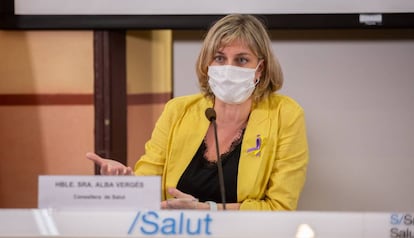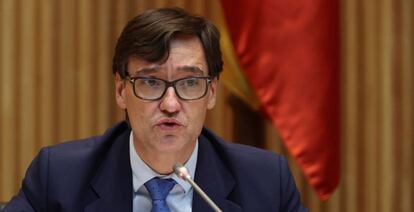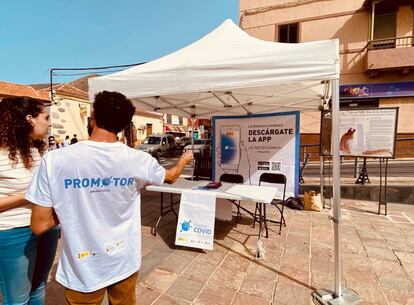Spain reports nearly 1,000 new daily Covid-19 cases
As the country grapples with a surge in infections, authorities have requested financial assistance from a EU loan program to soften the effects of coronavirus on employment

Spain is creating a new coordination agency and speeding up contact tracing capacity in a bid to curb a new surge in coronavirus contagion. As one of the hardest hit economies in the European Union, it has also become the first member to request financial aid from a EU fund to mitigate the impact of Covid-19 on employment.
On Monday, the Health Ministry said it had counted 8,532 new cases since Friday, and 968 in the last 24 hours. In the 40 days since the end of the state of alarm, the number of confirmed infections has risen eightfold, jumping from 334 on June 20 to 2,789 between July 29 and 30. The regions of Aragón, Catalonia and Madrid have experienced particularly high growth.
The Catalan government on Monday announced that over 100,000 people have been affected by Covid-19 in the region since the beginning of the pandemic. These figures are based on PCR tests, antibody tests and probable cases.
The contagion curve in Catalonia has stabilized but the risk of new outbreaks remains high. Recent clusters detected in Barcelona and the area of Segrià, which includes the city of Lleida, now appear to be in check, but cases are surging in the area of Vallès and in towns located near Barcelona, such as Sant Cugat, Gavà and Viladecans.
Authorities in Aragón, another Spanish region hard hit by new outbreaks, has now extended its restrictions on nighttime entertainment and banned outdoor drinking by young crowds (botellones), said the regional health chief Sira Ripollés at a news conference.
New health agency

The Spanish government has created a new department to improve coronavirus coordination between central and regional authorities. The Health State Secretary’s Office will report to Health Minister Salvador Illa.
This new agency will support Illa “in the communication of health policies and decisions that are adopted, bringing greater transparency to the government’s actions,” said the ministry in a press release. The department is also expected to “substantially improve coordination and cooperation” with regional health authorities.
In Spain, healthcare is devolved to the regions, which have been grappling with a new surge in coronavirus infections since a three-month state of alarm ended on June 21.
SURE loans
Spain has become the first European country to formally request funds from a European Union credit scheme aimed at softening the impact of Covid-19 on the job market.
The Spanish government has asked for around €20 billion in loans from the Support to mitigate Unemployment Risks in an Emergency (SURE) program, which is expected to lend up to €100 billion to members in need.
The Economy Ministry said the money will fund support programs for employees, self-employed workers and businesses, and cover the costs of Spain’s ERTE furloughing scheme, as well as the lost revenue from social security contributions. The Spanish executive had been hoping to end the furlough plan in September, but a historically bad tourism season is forcing authorities to reconsider.
The final amount allocated to Spain will depend, among other things, on how much other applicants request. The Economy Ministry is expecting around 18 countries to file for SURE loans.
Covid app

The constant trickle of outbreaks and pressure from the tourism industry have accelerated plans for a contact tracing app called Radar COVID, which will be available nationwide on September 15. A trial version will be launched next week in “two or three” regions of Spain which have yet to be announced, according to Carme Artigas, State Secretary for Digitization and Artificial Intelligence. An early trial run has been taking place on the island of La Gomera, in the Canary Islands. During that time, the app simulated a wave of 300 infections among 3,000 users in order to test the efficiency of the system.
Contact tracers in Madrid
When Spain began to gradually ease its strict lockdown in May, the Madrid region was repeatedly denied permission to move on to the next stage of deescalation due to its lack of preparedness. When it entered Phase 2 on June 8, it did so on the promise that it would hire nearly 1,000 professionals for the region’s primary healthcare centers and at least 100 contact tracers.
But regional figures show that the promise was not kept. By late July, only 100 new professionals were working in primary healthcare centers, while the contact tracing staff numbered 182 when it should have been at least 269.
Since mid-July, the number of diagnosed cases has been rising exponentially in the region, which is now starting to incorporate the staff that should have been there between late May and early June.
English version by Susana Urra.
Tu suscripción se está usando en otro dispositivo
¿Quieres añadir otro usuario a tu suscripción?
Si continúas leyendo en este dispositivo, no se podrá leer en el otro.
FlechaTu suscripción se está usando en otro dispositivo y solo puedes acceder a EL PAÍS desde un dispositivo a la vez.
Si quieres compartir tu cuenta, cambia tu suscripción a la modalidad Premium, así podrás añadir otro usuario. Cada uno accederá con su propia cuenta de email, lo que os permitirá personalizar vuestra experiencia en EL PAÍS.
¿Tienes una suscripción de empresa? Accede aquí para contratar más cuentas.
En el caso de no saber quién está usando tu cuenta, te recomendamos cambiar tu contraseña aquí.
Si decides continuar compartiendo tu cuenta, este mensaje se mostrará en tu dispositivo y en el de la otra persona que está usando tu cuenta de forma indefinida, afectando a tu experiencia de lectura. Puedes consultar aquí los términos y condiciones de la suscripción digital.









































